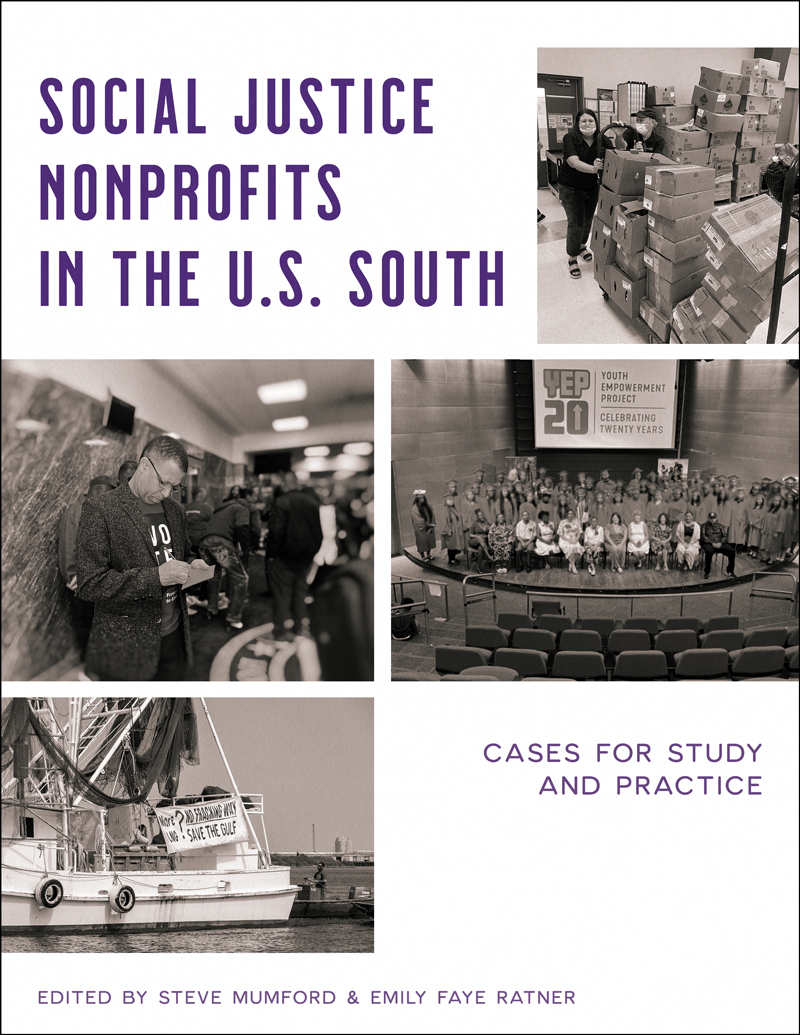Social Justice Nonprofits in the U.S. South: Cases for Study and Practice
Author(s): Steven Mumford , Emily Ratner
Edition: 1
Copyright: 2025
Pages: 162
Choose Your Platform | Help Me Choose
Nonprofits have sought to advance social justice in the United States for a long time with varying degrees of commitment and results. While nonprofits earn well-deserved praise for amplifying the voices of historically marginalized people through advocacy, scholars and practitioners rightfully question their ability to transform society towards the ideal of social justice.
This book celebrates the tenacious work of leaders of nonprofit organizations and voluntary associations pursuing social justice in the U.S. South. Six strength-based teaching cases highlight exemplary models for advancing social justice within challenging contexts. The real-world cases "show, not tell" readers how they can steer nonprofits with innovation, equity, and cultural responsiveness to confront entrenched injustices.
Written in an engaging narrative style, each teaching case builds on relevant literature and themes from academic and practitioner discourse in the social justice and nonprofit fields. An instructor guide accompanies each case, providing strategies, and additional resources for guiding learners as they apply insights to their own practice. By sharing social justice nonprofits' compelling stories, this book serves as an educational resource for instructors, learners in higher education, and nonprofit practitioners of all backgrounds who wish to enhance their impact
Acknowledgments
Note to Instructors: What This Book Offers You
Steve Mumford
Introduction: Your Roadmap to This Book
Steve Mumford and Emily Faye Ratner
Chapter 1: Charitable Service and Social Justice: The Harry Tompson Center’s Collaborative Approach to Addressing Houselessness
Stephanie M. Riegel
PART I: “There Was Nothing I Could Do”
PART II: A Faith-Based Response to the Houselessness Crisis
PART III: Charity and Social Justice?
PART IV: Collaborating to Deliver on a Shared Mission
PART V: Managerialist Tensions Pulling Away from Mission
AFTERWORD: Resolution?
References
Instructor Guide
Chapter 2: “I Am the Idea of What Is Possible”: Centering and Safeguarding Lived Experience in Nonprofit Leadership and Mission-Driven Work
Emily Faye Ratner and Ronald Marshall
PART I: The Long Way Home
PART II: Voice of the Experienced and Voters Organized to Educate
PART III: “Nothing About Us Without Us”
PART IV: Organizing for Freedom in the Incarceration Capital of the World
PART V: Calling All Allies
PART VI: Violence, Poverty, and Trauma in Louisiana
PART VII: To the Capitol!
AFTERWORD: I Am the Idea of What Is Possible
References
Instructor Guide
Chapter 3: The Power of (Re)Vision: Celebrating 20 Years of Adaptive Leadership at the Youth Empowerment Project
Monique Nolan Legendre, Melissa Sawyer, Darrin McCall, and August J. Collins Sr.
PART I: What Do We Do? The Dream of Reforming the Juvenile Legal System
PART II: Pivot, Persist, Adapt, or Pack Up? Emergent Strategy and Adaptive Leadership
PART III: We Could Do That! Post-Katrina Adaptation and Turnaround
PART IV: We Are Doing It! Growing to Meet Needs
PART V: We Can Do It Again! Practicing Resilience and Maturing
AFTERWORD: Celebrating 20 Years of the Youth Empowerment Project
References
Instructor Guide
Chapter 4: Breaking News: Truth-Telling and Nonprofit Journalism in the Deep South
Amanda Mester, Terry Baquet, and David Francis
PART I: A Daring Undertaking
PART II: A Shrinking Number of Resources
PART III: Disrupting Stagnancy
PART IV: “All Hands on Deck”
PART V: Bearing Witness to Somebody’s Story
AFTERWORD: “We Are Here Because We Want to Be Here”
References
Instructor Guide
Chapter 5: Making Waves: How Grassroots Organizing Can Challenge Environmental Injustices
Kimberly Kay James and Travis Dardar
PART I: The Flotilla
PART II: Travis’s Background
PART III: Louisiana’s Context
PART IV: The Bucket and the Brigade
PART V: The Louisiana Bucket Brigade and FISH
AFTERWORD: The Rest of the Story
References
Instructor Guide
Chapter 6: Strong Relationships and Deep Expertise: Trust-Based Philanthropy and Equitable Evaluation in a Community Foundation’s Disaster Response
Michelle Lawrence Bidwell, Kellie Chavez Greene, and Isabel Barrios
PART I: An Ominous Anniversary
PART II: Disaster Strategy
PART III: Meeting Crisis with Trust and Expertise
PART IV: From Crisis to Calling
PART V: Participant Stories
AFTERWORD: Lighthouse at the End of the Tunnel
References
Instructor Guide
Conclusion: The End of Our Roadmap and the Beginning of Yours
Emily Faye Ratner
About the Authors
Steve Mumford, PhD, Associate Professor of Political Science, University of New Orleans
Since 2018, Steve Mumford has taught and advised professional students in UNO's master of public administration (MPA) program and served as the founding coordinator of the PhD in justice studies. He earned his doctorate in public policy and administration from the George Washington University and has worked as a nonprofit program evaluator for almost 20 years. Steve has been published in peer-reviewed journals including Foundation Review, Public Integrity, Journal of Nonprofit and Public Affairs, Nonprofit Policy Forum, and Nonprofit and Voluntary Sector Quarterly. His research focuses on experiential learnings as well as equity and data use within Louisiana nonprofits. He recently co-edited the Research Handbook on Program Evaluation with Elgar Publishing. Steve teaches a series of three courses in nonprofit management using the case teaching method.
Emily Faye Ratner, JD
Emily Faye Ratner is a PhD student in justice studies at the University of New Orleans. She has worked with, supported, and represented nonprofit organizations of various forms, from small collectives to 501(c)(3)s. Her legal work focuses on defending and vindicating individuals targeted with criminal charges and other forms of state violence. She has served as an adjunct faculty member at the Loyola University of New Orleans College of Law, teaching students who are attaining practical legal experience by externing at nonprofit organizations. Her scholarship and media work examine the leadership of disenfranchised and criminalized people in expanding the rights, access, and state-recognized humanity of people.
Nonprofits have sought to advance social justice in the United States for a long time with varying degrees of commitment and results. While nonprofits earn well-deserved praise for amplifying the voices of historically marginalized people through advocacy, scholars and practitioners rightfully question their ability to transform society towards the ideal of social justice.
This book celebrates the tenacious work of leaders of nonprofit organizations and voluntary associations pursuing social justice in the U.S. South. Six strength-based teaching cases highlight exemplary models for advancing social justice within challenging contexts. The real-world cases "show, not tell" readers how they can steer nonprofits with innovation, equity, and cultural responsiveness to confront entrenched injustices.
Written in an engaging narrative style, each teaching case builds on relevant literature and themes from academic and practitioner discourse in the social justice and nonprofit fields. An instructor guide accompanies each case, providing strategies, and additional resources for guiding learners as they apply insights to their own practice. By sharing social justice nonprofits' compelling stories, this book serves as an educational resource for instructors, learners in higher education, and nonprofit practitioners of all backgrounds who wish to enhance their impact
Acknowledgments
Note to Instructors: What This Book Offers You
Steve Mumford
Introduction: Your Roadmap to This Book
Steve Mumford and Emily Faye Ratner
Chapter 1: Charitable Service and Social Justice: The Harry Tompson Center’s Collaborative Approach to Addressing Houselessness
Stephanie M. Riegel
PART I: “There Was Nothing I Could Do”
PART II: A Faith-Based Response to the Houselessness Crisis
PART III: Charity and Social Justice?
PART IV: Collaborating to Deliver on a Shared Mission
PART V: Managerialist Tensions Pulling Away from Mission
AFTERWORD: Resolution?
References
Instructor Guide
Chapter 2: “I Am the Idea of What Is Possible”: Centering and Safeguarding Lived Experience in Nonprofit Leadership and Mission-Driven Work
Emily Faye Ratner and Ronald Marshall
PART I: The Long Way Home
PART II: Voice of the Experienced and Voters Organized to Educate
PART III: “Nothing About Us Without Us”
PART IV: Organizing for Freedom in the Incarceration Capital of the World
PART V: Calling All Allies
PART VI: Violence, Poverty, and Trauma in Louisiana
PART VII: To the Capitol!
AFTERWORD: I Am the Idea of What Is Possible
References
Instructor Guide
Chapter 3: The Power of (Re)Vision: Celebrating 20 Years of Adaptive Leadership at the Youth Empowerment Project
Monique Nolan Legendre, Melissa Sawyer, Darrin McCall, and August J. Collins Sr.
PART I: What Do We Do? The Dream of Reforming the Juvenile Legal System
PART II: Pivot, Persist, Adapt, or Pack Up? Emergent Strategy and Adaptive Leadership
PART III: We Could Do That! Post-Katrina Adaptation and Turnaround
PART IV: We Are Doing It! Growing to Meet Needs
PART V: We Can Do It Again! Practicing Resilience and Maturing
AFTERWORD: Celebrating 20 Years of the Youth Empowerment Project
References
Instructor Guide
Chapter 4: Breaking News: Truth-Telling and Nonprofit Journalism in the Deep South
Amanda Mester, Terry Baquet, and David Francis
PART I: A Daring Undertaking
PART II: A Shrinking Number of Resources
PART III: Disrupting Stagnancy
PART IV: “All Hands on Deck”
PART V: Bearing Witness to Somebody’s Story
AFTERWORD: “We Are Here Because We Want to Be Here”
References
Instructor Guide
Chapter 5: Making Waves: How Grassroots Organizing Can Challenge Environmental Injustices
Kimberly Kay James and Travis Dardar
PART I: The Flotilla
PART II: Travis’s Background
PART III: Louisiana’s Context
PART IV: The Bucket and the Brigade
PART V: The Louisiana Bucket Brigade and FISH
AFTERWORD: The Rest of the Story
References
Instructor Guide
Chapter 6: Strong Relationships and Deep Expertise: Trust-Based Philanthropy and Equitable Evaluation in a Community Foundation’s Disaster Response
Michelle Lawrence Bidwell, Kellie Chavez Greene, and Isabel Barrios
PART I: An Ominous Anniversary
PART II: Disaster Strategy
PART III: Meeting Crisis with Trust and Expertise
PART IV: From Crisis to Calling
PART V: Participant Stories
AFTERWORD: Lighthouse at the End of the Tunnel
References
Instructor Guide
Conclusion: The End of Our Roadmap and the Beginning of Yours
Emily Faye Ratner
About the Authors
Steve Mumford, PhD, Associate Professor of Political Science, University of New Orleans
Since 2018, Steve Mumford has taught and advised professional students in UNO's master of public administration (MPA) program and served as the founding coordinator of the PhD in justice studies. He earned his doctorate in public policy and administration from the George Washington University and has worked as a nonprofit program evaluator for almost 20 years. Steve has been published in peer-reviewed journals including Foundation Review, Public Integrity, Journal of Nonprofit and Public Affairs, Nonprofit Policy Forum, and Nonprofit and Voluntary Sector Quarterly. His research focuses on experiential learnings as well as equity and data use within Louisiana nonprofits. He recently co-edited the Research Handbook on Program Evaluation with Elgar Publishing. Steve teaches a series of three courses in nonprofit management using the case teaching method.
Emily Faye Ratner, JD
Emily Faye Ratner is a PhD student in justice studies at the University of New Orleans. She has worked with, supported, and represented nonprofit organizations of various forms, from small collectives to 501(c)(3)s. Her legal work focuses on defending and vindicating individuals targeted with criminal charges and other forms of state violence. She has served as an adjunct faculty member at the Loyola University of New Orleans College of Law, teaching students who are attaining practical legal experience by externing at nonprofit organizations. Her scholarship and media work examine the leadership of disenfranchised and criminalized people in expanding the rights, access, and state-recognized humanity of people.



